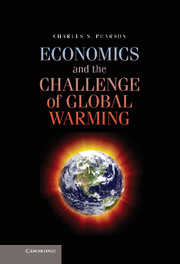Book contents
- Frontmatter
- Contents
- Acknowledgments
- Introduction and a Road Map
- 1 Climate Change
- 2 The Role of Benefit Cost in Climate Policy
- 3 Discounting and Social Weighting (Aggregating over Time and Space)
- 4 Empirical Estimates
- 5 Strategic Responses
- 6 Targets and Tools
- 7 Trade and Global Warming
- 8 The Challenge of International Cooperation
- 9 Beyond Kyoto
- 10 A Summing-Up
- Index
- References
5 - Strategic Responses
Published online by Cambridge University Press: 05 June 2012
- Frontmatter
- Contents
- Acknowledgments
- Introduction and a Road Map
- 1 Climate Change
- 2 The Role of Benefit Cost in Climate Policy
- 3 Discounting and Social Weighting (Aggregating over Time and Space)
- 4 Empirical Estimates
- 5 Strategic Responses
- 6 Targets and Tools
- 7 Trade and Global Warming
- 8 The Challenge of International Cooperation
- 9 Beyond Kyoto
- 10 A Summing-Up
- Index
- References
Summary
This chapter marks a transition from our initial concern with the role of benefit cost (BC) analysis of mitigation to a broader focus on policy responses to climate change. The portfolio of responses starts with accelerated economic development and includes adaptation, a closer look at supply policy, technology, and extreme technology in the guise of geo-engineering. Each can add a useful element to the set of responses but mitigation (abatement) remains the center piece.
The Development Option
An argument can be made that the single most cost-effective response to global warming is accelerated economic development concentrated in poor countries. As discussed in Chapter 3, this strategy has a basis in efficiency and in ethics. Many (not all) economic studies suggest that in the near term, the return to investment in mitigating global warming is trumped by returns to more conventional development investments – physical infrastructure, health, education, and focused research and development. Investments that build productive capacity in developing countries also meet ethical concerns. They help alleviate poverty in the near term and help compensate future generations for climate damages by leaving them a larger productive base. Perhaps most important, all of the adaptation literature demonstrates that the capacity to adapt to higher temperatures is far greater in rich countries than in poor developing countries.
- Type
- Chapter
- Information
- Economics and the Challenge of Global Warming , pp. 97 - 123Publisher: Cambridge University PressPrint publication year: 2011



